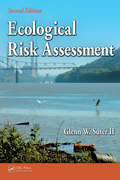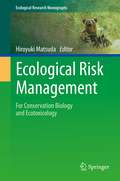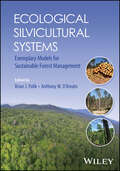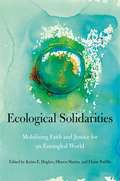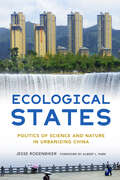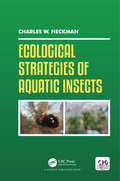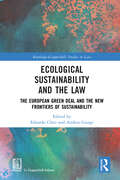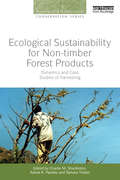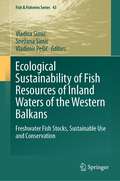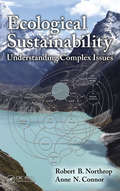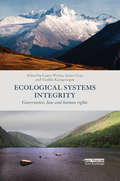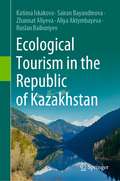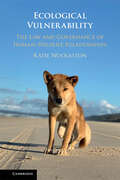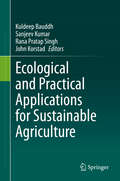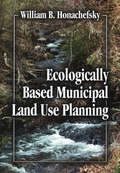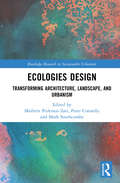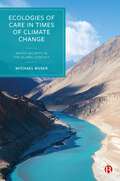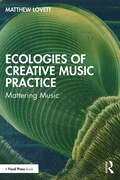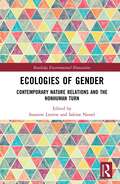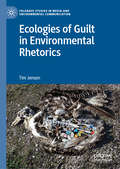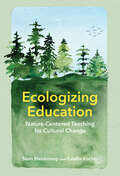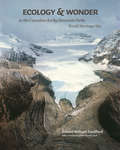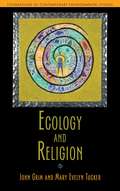- Table View
- List View
Ecological Reviews: Conflicts in Conservation
by Redpath, Stephen M. and Gutiérrez, R. J. and Wood, Kevin A. and Young, Juliette C. Stephen M. Redpath R. J. Gutiérrez Kevin A. Wood Juliette C. YoungConflicts over the conservation of biodiversity are increasing and are serious obstacles to wildlife conservation efforts worldwide. Changing patterns in land use, over-exploitation, pollution, climate change and the threat posed by invasive species all challenge the way we currently maintain and protect biodiversity - from the local management of single species to the international management of resources. Integrating approaches from different academic disciplines, policy makers and practitioners, this volume offers a radically new, cross-disciplinary, multi-scale approach to deal with conflicts. Groundbreaking strategies for conservation are analysed and a large section of the book is devoted to exploring case studies of conflict from around the world. Aimed primarily at academics, researchers and students from disciplines relating to conservation, ecology, natural resources management and environmental governance, this book will be equally valuable to conservation NGOs and practitioners, and the policy community at national and international levels.
Ecological Risk Assessment
by Glenn W. Suter IIThe definitive reference in its field, Ecological Risk Assessment, Second Edition details the latest advances in science and practice. In the fourteen years since the publication of the best-selling first edition, ecological risk assessment (ERA) has moved from the margins into the spotlight. It is now commonly applied to the regulation of c
Ecological Risk Management: For Conservation Biology and Ecotoxicology (Ecological Research Monographs)
by Hiroyuki MatsudaThis book introduces the theory and practice of ecological risk management. Using recent and live case studies in Japan, the book explains the use of basic mathematical techniques in extinction risk, adaptive population management, avian collision risk in wind farms, potential biological removal for marine mammals, and ecological risk assessment of heavy metals. The focus of this book is on case studies of nature conservation in Japan, including internationally renowned topics of Japanese fisheries, Shiretoko World Heritage, Fukushima Daiichi Nuclear Power Plant accident. It also covers the adaptive risk management of the new coronavirus disease.The book comprises four parts covering ecotoxicology, fisheries, wildlife management and conservation, and ecosystem-based management. It differs from other books in having its primary interest in human impacts on animals, plant, and ecosystems, while existing works in this area concentrate on the fate of toxic substances in the environments and their effects on humans. This book is unique in that it indicates various environmental issues that the theoretical ecology is potentially applicable without concentrating into any particular subject such as ecotoxicology or conservation biology. Primary readers are undergraduate/graduate students, staffs of environmental consultant companies and environmental NPOs, and journalists. Readers will find this book useful for its abundant information on case studies of ecological risk management and consensus building in Japan.
Ecological Silvicultural Systems: Exemplary Models for Sustainable Forest Management
by Brian J. Palik Anthony W. D’AmatoECOLOGICAL SILVICULTURAL SYSTEMS Unleash the natural power and adaptability of forests with this cutting-edge guide For generations, silvicultural systems have focused largely on models whose primary objective is the production of timber, leading to drastically simplified forests with reduced ecological richness, diversity, and complexity. Ecological silviculture, by contrast, focuses on producing and maintaining forests with “all their parts”—, that is, with the diversity and flexibility to respond and adapt to global changes. Ecological silviculture seeks to emulate natural development models and sustain healthy forests serving multiple values and goals. Ecological Silvicultural Systems provides a comprehensive introduction to these approaches and their benefits tailored to diverse types of forests, designed for forest management professionals. It provides a series of exemplary models for ecological silviculture and surveys the resulting forest ecosystems. The result is a text that meets the needs of professionals in forestry and natural resource management with an eye towards sustaining healthy forest ecosystems, adapting them to climate change, protecting them from invasive species, and responding to changing market forces. Ecological Silvicultural Systems readers will also find: Detailed treatment of forest ecosystems in North America, Europe, South America, and Australia A broad field of contributors with decades of combined expertise on multiple continents Discussion of pine woodlands; temperate hardwood forests, boreal forests, temperate rainforests, and more Ecological Silvicultural Systems is a useful reference for professional foresters, wildlife habitat managers, restoration ecologists, and undergraduate and graduate students in any of these fields.
Ecological Solidarities: Mobilizing Faith and Justice for an Entangled World (World Christianity #1)
by Krista E. HughesOperating on the premise that our failure to recognize our interconnected relationship to the rest of the cosmos is the origin of planetary peril, this volume presents academic, activist, and artistic perspectives on how to inspire reflection and motivate action in order to construct alternative frameworks and establish novel solidarities for the sake of our planetary home.The selections in this volume explore ecologies of interdependence as a frame for religious, theological, and philosophical analysis and practice. Contributors examine questions of justice, climate change, race, class, gender, and coloniality and discuss alternative ways of engaging the world in all its biodiversity. Each essay, poem, reflection, and piece of art contributes to and reflects upon how to live out entangled differences toward positive global change.Constructive and practical, global and local, communal and personal, Ecological Solidarities is an innovative contribution to the discourses on relational and liberative thought and practice in religion, philosophy, and theology. It will be welcomed by scholars of World Christianity and theology as well as seminary students, activists, and laity interested in issues of justice and ecology.
Ecological Solidarities: Mobilizing Faith and Justice for an Entangled World (World Christianity)
by Krista E. HughesOperating on the premise that our failure to recognize our interconnected relationship to the rest of the cosmos is the origin of planetary peril, this volume presents academic, activist, and artistic perspectives on how to inspire reflection and motivate action in order to construct alternative frameworks and establish novel solidarities for the sake of our planetary home.The selections in this volume explore ecologies of interdependence as a frame for religious, theological, and philosophical analysis and practice. Contributors examine questions of justice, climate change, race, class, gender, and coloniality and discuss alternative ways of engaging the world in all its biodiversity. Each essay, poem, reflection, and piece of art contributes to and reflects upon how to live out entangled differences toward positive global change.Constructive and practical, global and local, communal and personal, Ecological Solidarities is an innovative contribution to the discourses on relational and liberative thought and practice in religion, philosophy, and theology. It will be welcomed by scholars of World Christianity and theology as well as seminary students, activists, and laity interested in issues of justice and ecology.
Ecological States: Politics of Science and Nature in Urbanizing China (The Environments of East Asia)
by Jesse RodenbikerEcological States critically examines ecological policies in the People's Republic of China to show how campaigns of scientifically based environmental protection transform nature and society. While many point to China's ecological civilization programs as a new paradigm for global environmental governance, Jesse Rodenbiker argues that ecological redlining extends the reach of the authoritarian state.Although Chinese urban sustainability initiatives have driven millions of citizens from their land and housing, Rodenbiker shows that these migrants are not passive subjects of state policy. Instead, they creatively navigate resettlement processes in pursuit of their own benefit. However, their resistance is limited by varied forms of state-backed infrastructural violence. Through extensive fieldwork with scientists, urban planners, and everyday citizens in southwestern China, Ecological States exposes the ways in which the scientific logics and practices fundamental to China's green urbanization have solidified state power and contributed to dispossession and social inequalityWith support from the Henry Luce Foundation, our goal is to produce all titles in this series both in Open Access, for reasons of global accessibility and equity, as well as in print editions.
Ecological Strategies of Aquatic Insects
by Charles W. HeckmanThis book recounts the habits of many interesting and unusual exceptions to the rule that insects are typically terrestrial forms of life. It examines the different ways that groups of species have developed modes of existence in or on the surface of water, and gives reasons why the gross morphology of insects is not favorable for life in or near bodies of water, such as wings that fail to function after coming into contact with water, rendering them useless.
Ecological Sustainability and the Law: The European Green Deal and the New Frontiers of Sustainability (Routledge-Giappichelli Studies in Law)
by Edoardo Chiti Andrea GiorgiThis book explores the emergence of ecological sustainability as a new EU policy and legal objective, distinct and autonomous from sustainable development. It argues that sustainability can no longer be conflated into sustainable development only, but should rather be represented as a plural construction, in which ecological sustainability coexists next to sustainable development. While the latter orientates most of the regulatory measures stemming from the Green Deal, the former is playing an increasingly relevant role in a number of legislative initiatives. The volume considers whether and how the EU legislator is exploiting the new opportunities brought forth by the redefinition of sustainability. To do so, a thematic approach is adopted and the inquiry is organized in five different parts, each devoted to one specific transition triggered by the European Green Deal. Navigating the dynamics of the many transitions occurring in the horizon of European climate neutrality, key chapters shed light on the EU regulatory schemes through which ecological sustainability is in the process of being operationalized and critically discuss their points of strength, weaknesses and underlying tensions. In doing so, they provide an overview of the legal changes occurring in areas of topical interest such as agri-food, energy, digitalization, corporate governance and intellectual property, as well as a number of insights on the relevance of ecological sustainability for the internal dynamism of the European Green Deal. This extensive and innovative appraisal of the field will prove a stimulating read for academics, researchers and advanced students interested in the new ecological law stemming from the Green Deal, the changing features of sustainability and the relevance of the Green Deal as a regulatory project.
Ecological Sustainability for Non-timber Forest Products: Dynamics and Case Studies of Harvesting (People and Plants International Conservation)
by Charlie M. Shackleton Ashok K. Pandey Tamara TicktinThere is growing knowledge about and appreciation of the importance of Non-timber Forest Products (NTFPs) to rural livelihoods in developing countries, and to a lesser extent, developed countries. However, there is also an assumption on the part of policy-makers that any harvesting of wild animal or plant products from the forests and other natural and modified ecosystems must be detrimental to the long-term viability of target populations and species. This book challenges this idea and shows that while examples of such negative impacts certainly exist, there are also many examples of sustainable harvesting systems for NTFPs. The chapters review and present coherent and scientifically sound information and case studies on the ecologically sustainable use of NTFPs. They also outline a general interdisciplinary approach for assessing the sustainability of NTFP harvesting systems at different scales. A wide range of case studies is included from Africa, Asia and South America, using plant and animal products for food, crafts, textiles, medicines and cosmetics.
Ecological Sustainability of Fish Resources of Inland Waters of the Western Balkans: Freshwater Fish Stocks, Sustainable Use and Conservation (Fish & Fisheries Series #43)
by Vladimir Pešić Vladica Simić Snežana SimićThis book provides a detailed evaluation of the hydro-ecological characteristics of the Western Balkans, an area characterized by still preserved inland waters and fish resources important for the European continent, as well as the biodiversity of inland waters important for the planet Earth. Freshwater ecosystems cover only 1% of the Earth's surface; however, they are a habitat for about 40% of fish species. At the same time, inland fisheries make less than 12% of the world's global fish catch, with 43% coming from low-income and food-deficient countries (Africa, South America, Southeast Asia). In Europe, the Western Balkans have significant fishing waters and fish resources, including the Middle Danube drainage (Sava, Drina, Velika Morava river systems), large ancient lakes (Skadar/Shkodra, Ohrid, Prespa, Dojran), and the Adriatic basin characterized by endemic and commercially important species. However, in contrast to the high fishing potential in a significant part of the Western Balkans, diverse and specific political, economic, and social factors largely had a negative impact on the state of fish resources. This volume is multidisciplinary and provides a sound knowledge base for scientific and practical fisheries. In addition, it may be a valuable guide for managers and conservationists worldwide to adapt methods and procedures for the ecological sustainability of fish resources under specific local, natural, and socio-economic conditions. Finally, the content is a good reference for natural sciences and agriculture students studying fish, fish resources, and fisheries sciences. It would improve their knowledge and perspectives on the challenges of sustainable use and conservation of inland water resources.
Ecological Sustainability: Understanding Complex Issues
by Robert B. Northrop Anne N. ConnorComplex systems is a new field of science studying how parts of a system give rise to the collective behaviors of the system, and how the system interacts with its environment. This book examines the complex systems involved in environmental sustainability, and examines the technologies involved to help mitigate human impacts, such as renewable ene
Ecological Systems Integrity: Governance, law and human rights
by Laura Westra, Janice Gray and Vasiliki KarageorgouEnvironmental law and governance are the cornerstones of global efforts to conserve the environment, protect resources and ensure fair and equitable outcomes for all of the planet's inhabitants. This book presents a series of thought-provoking chapters which consider the place of governance and law in the defence against imminent and ongoing threats to ecological, social and cultural integrity. Written by an international team of both established and early-career scholars from various disciplines and backgrounds, the chapters cover the most pressing and contemporary issues in environmental law and governance. These include access and benefit-sharing; the right to food and water; climate change coping and adaptation; human rights; the rights of indigenous communities; public and environmental health; and many more. The book has a general focus on environmental governance and law in the European Union and offers points of comparison with Canada and North and South America.
Ecological Tourism in the Republic of Kazakhstan
by Sairan Bayandinova Katima Iskakova Zhannat Aliyeva Aliya Aktymbayeva Ruslan BaiburiyevThis book analyses the theoretical and methodological foundations of ecotourism and geotourism and examines the essence, content, factors, and models of ecotourism development. The authors conducted research to assess the tourist and recreational potential of ecotourism in Kazakhstan. The study analyses the current state and describes the problems of the long-term development of ecotourism. Besides, the authors also show the role of specially protected natural areas in ecotourism development, including a list of organizations that can create tourist products in the environmental direction. This book also defines the primary conditions necessary for ecotourism in protected natural and rural areas. The resulting cartographic material visualizes the geospatial potential of the regions of Kazakhstan, aiming a more targeted expenditure of financial resources allocated to tourism development. Thus, the presented book is relevant from a practical perspective to scientists and researchers and is of value to business structures and stakeholders.
Ecological Vulnerability: The Law and Governance of Human–Wildlife Relationships
by Katie WoolastonHumans are responsible for biodiversity loss in many related and sometimes conflicting ways. Human-wildlife conflict, commonly defined as any negative interaction between people and wildlife, is a primary contributor to wildlife extinction and a manifestation of the destructive relationship that people have with wildlife. The author presents this 'wicked' problem in a social and legal context and demonstrates that legal institutions structurally deny human-wildlife conflict, while exacerbating conflict, promoting values consistent with individual autonomy, and ignoring the interconnected vulnerabilities shared by human and non-human species alike. It is the use of international and state law that sheds light on existing conflicts, including dingo conflict on K'Gari-Fraser Island in Australia, elephant conflict in Northern Botswana, and the global wildlife trade contributing to COVID-19. This book presents a critical analysis of human-wildlife conflict and its governance, to guide lawyers, scientists and conservations alike in the transformation of the management of human-wildlife conflict.
Ecological and Practical Applications for Sustainable Agriculture
by Rana Pratap Singh Kuldeep Bauddh Sanjeev Kumar John KorstadRampant industrialization, urbanization, and population growth have resulted in increased global environmental contamination. The productivity of agricultural soil is drastically deteriorated and requires a high dose of fertilizers to cultivate crops. To ensure food security, farmers are compelled to apply excess chemical fertilizers and insecticides that contaminate soil, air, and water. Heavy loads of chemical fertilizers not only degrade the quality of agricultural land but also pollute water and air. Use of chemical fertilizers also accelerate the release of greenhouse gases like nitrous oxide and methane along with nutrient runoff from the watershed in to lower elevation rivers and lakes, resulting in cultural eutrophication.Farming practices globally in developed, developing, and under-developing countries should utilize and promote sustainable methods through viable combined environmental, social, and economic means that improve rather than harm future generations. This can include use of non-synthetic fertilizers like compost, vermicompost, slow-release fertilizers, farmyard manures, crop rotations that include nitrogen-fixing legumes. Organic fertilizers like compost and vermicompost improve soil properties like texture, porosity, water-holding capacity, organic matter, as well as nutrient availability. The purpose of this book is to document the available alternatives of synthetic fertilizers, their mode of action, efficiency, preparation methodology, practical suggestions for sustainable practices, and needed research focus. The book will cover major disciplines like plant science, environmental science, agricultural science, agricultural biotechnology and microbiology, horticulture, soil science, atmospheric science, agro-forestry, agronomy, and ecology. This book is helpful for farmers, scientists, industrialists, research scholars, masters and graduate students, non-governmental organizations, financial advisers, and policy makers.
Ecologically Based Municipal Land Use Planning
by William B HonachefskyIn the decades following the first Earth Day in 1970, a generation has been enlightened about the unspeakable damage done to our planet. Federal, state, and local governments generated laws and regulations to control development and protect the environment. Local governments have developed environmental standards addressing their needs. The result-an ecologically incongruous pattern of land development known as urban sprawl.Local land use planners can have a greater effect on the quality of our environment than all of the federal and state regulators combined. Historically, they have existed on the periphery of land management. The author suggests that federal and state environmental regulators need to incorporate local governments into their environmental protection plans. Ecologically Based Municipal Land Use Planning provides easily understood, nuts and bolts solutions for controlling urban sprawl, emphasizing the integration of federal, state, and local land use plans.The book discusses ecological resources and provides practical solutions that municipal planners can implement immediately. It discusses the most recent scientific data, how to extract what is important, and how to apply it to the local land planning process. The author includes the application of the Geographic Information Systems (GIS) to problem solving.Despite compelling evidence and sound arguments favoring the implementation of an ecologically sensitive approach to land use planning, municipal planners, in general, remain skeptical. It will take considerably more encouragement and education to win them over completely. Ecologically Based Municipal Land Use Planning makes the case for sound land use policies that will reduce sprawl.
Ecologies Design: Transforming Architecture, Landscape, and Urbanism (Routledge Research in Sustainable Urbanism)
by Peter Connolly Maibritt Pedersen Zari Mark SouthcombeThe notion of ecology has become central to contemporary design discourse. This reflects contemporary concerns for our planet and a new understanding of the primary entanglement of the human species with the rest of the world.The use of the term ‘ecology’ with design tends to refer to how to integrate ecologies into design and cities and be understood in a biologically-scientific and technical sense. In practice, this scientific-technical knowledge tends to be only loosely employed. The notion of ecology is also often used metaphorically in relation to the social use of space and cities. This book argues that what it calls the ‘biological’ and ‘social’ senses of ecology are both important and require distinctly different types of knowledge and practice. It proposes that science needs to be taken much more seriously in ‘biological ecologies’, and that ‘social ecologies’ can now be understood non-metaphorically as assemblages. Furthermore, this book argues that design practice itself can be understood much more rigorously, productively and relevantly if understood ecologically. The plural term ‘ecologies design’ refers to these three types of ecological design. This book is unique in bringing these three perspectives on ecological design together in one place. It is significant in proposing that a strong sense of ecologies design practice will only follow from the interconnection of these three types of practice. Ecologies Design brings together leading international experts and relevant case studies in the form of edited research essays, case studies and project work. It provides an overarching critique of current ecologically-oriented approaches and offers evidence and exploration of emerging and effective methods, techniques and concepts. It will be of great interest to academics, professionals and students in the built environment disciplines.
Ecologies of Care in Times of Climate Change: Water Security in the Global Context
by Michael BuserAvailable open access digitally under CC BY NC ND licence. This book investigates and analyses places in Europe, North America and Asia that are facing the immense challenges associated with climate change adaptation. Presenting real-world cases in the contexts of coastal change, drinking water and the cryosphere, Michael Buser shows how the concept of care can be applied to water security and climate adaptation. Exploring the everyday and often hidden ways in which water security is accomplished, the book demonstrates the pervasiveness and power of care to contribute to flourishing lives and communities in times of climate change.
Ecologies of Creative Music Practice: Mattering Music
by Matthew LovettEcologies of Creative Music Practice: Mattering Music explores music as a dynamic practice embedded in contemporary ecological contexts, one that both responds to, and creates change within, the ecologies in which it is created and consumed. This highly interdisciplinary analysis includes theoretical and practical considerations – from blockchain technology and digital platform commerce to artificial intelligence and the future of work, to sustainability and political ecology – as well as contemporary philosophical paradigms, guiding its investigation through three main lenses: How can music work as a conceptual tool to interrogate and respond to our changing global environment? How have transformations in our digital environment affected how we produce, distribute and consume music? How does music relate to matters of political ecology and environmental change? Within this framework, music is positioned as a starting point from which to examine a range of contexts and environments, offering new perspectives on contemporary technological and ecological discourse. Ecologies of Creative Music Practice: Mattering Music is a valuable text for advanced undergraduates, postgraduates, researchers and practitioners concerned with producing, performing, sharing and listening to music.
Ecologies of Gender: Contemporary Nature Relations and the Nonhuman Turn (Routledge Environmental Humanities)
by Susanne LettowEcologies of Gender: Contemporary Nature Relations and the Nonhuman Turn examines the role of gender in recent debates about the nonhuman turn in the humanities, and critically explores the implications for a contemporary theory of gender and nature relations. The interdisciplinary contributions in this volume each provides theoretical reflections based on an analysis of specific naturecultural processes. They reveal how "ecologies of gender" are constructed through aesthetic, epistemological, political, technological and economic practices that shape multispecies and material interrelations as well as spatial and temporal orderings. The volume includes contributions from cultural anthropology, cultural studies, film studies, literary studies, media studies, philosophy and theatre studies. The essays are organized around four key dimensions of an "ecological" understanding of gender: "creatures", "materials", "spaces" and "temporalities". The overall aim of the volume Ecologies of Gender: Contemporary Nature Relations and the Nonhuman Turn is to explore the potentialities and limitations of the nonhuman turn for a critical analysis and theory of ecologies of gender, and thereby make an original contribution to both the environmental humanities and gender studies. This book will be of great interest to scholars and students from the interdisciplinary field of the environmental humanities and environmental studies more broadly, as well as from gender studies and cultural theory.
Ecologies of Guilt in Environmental Rhetorics (Palgrave Studies in Media and Environmental Communication)
by Tim JensenEnvironmental rhetorics have expanded awareness of mass extinction, climate change, and pervasive pollution, yet failed to generate collective action that adequately addresses such pressing matters. This book contends that the anemic response to ecological upheaval is due, in part, to an inability to navigate novel forms of environmental guilt. Combining affect theory with rhetorical analysis to examine a range of texts and media, Ecologies of Guilt in Environmental Rhetorics positions guilt as a keystone emotion for contemporary environmental communication, and explores how it is provoked, perpetuated, and framed through everyday discourse. In revealing the need for emotional literacies that productively engage our complicity in global ecological harm, the book looks to a future where guilt—and its symbiotic relationships with anger, shame, and grief—is shaped in tune with the ecologies that sustain us.
Ecologizing Education: Nature-Centered Teaching for Cultural Change
by Sean Blenkinsop Estella C. KuchtaEcologizing Education explores how we can reenvision education to meet the demands of an unjust and rapidly changing world. Going beyond "green" schooling programs that aim only to shape behavior, Sean Blenkinsop and Estella Kuchta advance a pedagogical approach that seeks to instills eco-conscious and socially just change at the cultural level. Ecologizing education, as this approach is called, involves identifying and working to overcome anti-ecological features of contemporary education. This approach, called ecologizing education, aims to develop a classroom culture in sync with the more-than-human world where diversity and interdependency are intrinsic.Blenkinsop and Kuchta illustrate this educational paradigm shift through the real-world stories of two public elementary schools located in British Columbia. They show that this approach to learning starts with recognizing the environmental and social injustices that pervade our industrialized societies. By documenting how ecologizing education helps children create new relationships with the natural world and move toward mutual healing, Blenkinsop and Kuchta offer a roadmap for what may be the most potent chance we have at meaningful change in the face of myriad climate crises. Timely, practical, and ultimately inspirational, Ecologizing Education is vital reading for any parent, caregiver, environmentalist, or educator looking for wholistic education that places nature and the environment front and center.
Ecology And Religion
by Mary Evelyn Tucker John GrimFrom the Psalms in the Bible to the sacred rivers in Hinduism, the natural world has been integral to the world's religions. John Grim and Mary Evelyn Tucker contend that today's growing environmental challenges make the relationship ever more vital. This primer explores the history of religious traditions and the environment, illustrating how religious teachings and practices both promoted and at times subverted sustainability. Subsequent chapters examine the emergence of religious ecology, as views of nature changed in religious traditions and the ecological sciences. Yet the authors argue that religion and ecology are not the province of institutions or disciplines alone. They describe four fundamental aspects of religious life: orienting, grounding, nurturing, and transforming. Readers then see how these phenomena are experienced in a Native American religion, Orthodox Christianity, Confucianism, and Hinduism. Ultimately, Grim and Tucker argue that the engagement of religious communities is necessary if humanity is to sustain itself and the planet. Students of environmental ethics, theology and ecology, world religions, and environmental studies will receive a solid grounding in the burgeoning field of religious ecology.

